Ditapis dengan

The Political Philosophy Of Hannah Arendt
- Edisi
- First Published
- ISBN/ISSN
- 0-415-08790-2
- Deskripsi Fisik
- 217 pgs.; 23 cm.
- Judul Seri
- -
- No. Panggil
- 320.5 D'EN p
- Edisi
- First Published
- ISBN/ISSN
- 0-415-08790-2
- Deskripsi Fisik
- 217 pgs.; 23 cm.
- Judul Seri
- -
- No. Panggil
- 320.5 D'EN p
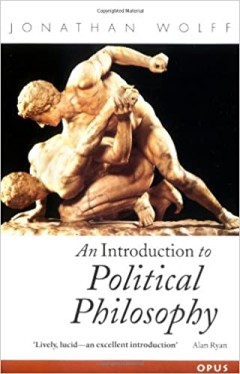
An Introduction To Political Philosophy
What would life be like without the state? What justifies the state? Who should rule? How much liberty should the citizen enjoy? How should property be justly distributed? This book examines the central problems involved in political philosophy and the past attempts to respond to these problems. Jonathan Wolff looks at the works of Plato, Hobbes, Locke, Rousseau, Mill, Marx, and Rawls (among ot…
- Edisi
- First Published
- ISBN/ISSN
- 0-19-289251-7
- Deskripsi Fisik
- x + 237 pgs.; 19,5 cm.
- Judul Seri
- -
- No. Panggil
- 320.01 WOL a
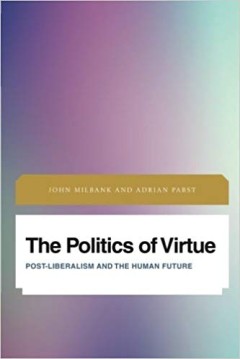
The Politics of Virtue: Post-Liberalism and the Human Future
Contemporary politics is dominated by a liberal creed that champions ‘negative liberty’ and individual happiness. This creed undergirds positions on both the right and the left – free-market capitalism, state bureaucracy and individualism in social life. The triumph of liberalism has had the effect of subordinating human association and the common good to narrow self-interest and short-te…
- Edisi
- -
- ISBN/ISSN
- 978-1-78348-649-6
- Deskripsi Fisik
- x + 407 pg.; 23 cm.
- Judul Seri
- -
- No. Panggil
- 320.51 MIL p
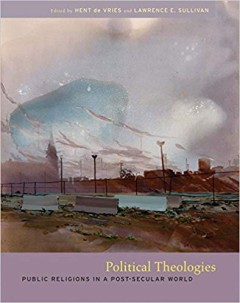
Political Theologies: Public Religions in a Post-Secular World
What has happened to religion in its present manifestations? In recent years, Enlightenment secularization, as it appeared in the global spread of political structures that relegate the sacred to a private sphere, seems suddenly to have foundered. Unexpectedly, it has discovered its own parochialism―has discovered, indeed, that secularization may never have taken place at all. With the “…
- Edisi
- First Print
- ISBN/ISSN
- 978-0-8232-2644-3
- Deskripsi Fisik
- xii + 796 pg.; ils.; 23,5 cm.
- Judul Seri
- -
- No. Panggil
- 201.72 POL p
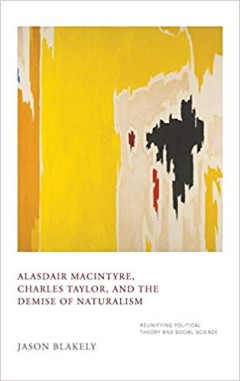
Alasdair MacIntyre, Charles Taylor, and The Demise of Naturalism
Today the ethical and normative concerns of everyday citizens are all too often sidelined from the study of political and social issues, driven out by an effort to create a more “scientific” study. This book offers a way for social scientists and political theorists to reintegrate the empirical and the normative, proposing a way out of the scientism that clouds our age. In Alasdair MacIntyr…
- Edisi
- First Print
- ISBN/ISSN
- 978-0-268-10064-3
- Deskripsi Fisik
- ix + 142 pg.; 23,5 cm.
- Judul Seri
- -
- No. Panggil
- 146 BLA a
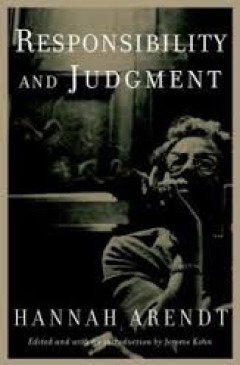
Responsibility and Judgement
Responsibility and Judgment gathers together unpublished writings from the last decade of Arendt’s life, where she addresses fundamental questions and concerns about the nature of evil and the making of moral choices. At the heart of the book is a profound ethical investigation, “Some Questions of Moral Philosophy,” in which Arendt confronts the inadequacy of traditional moral “truths�…
- Edisi
- -
- ISBN/ISSN
- 0805242120
- Deskripsi Fisik
- xxxvii + 295 pg.; 21,5 cm.
- Judul Seri
- -
- No. Panggil
- 172 ARE r

 Karya Umum
Karya Umum  Filsafat
Filsafat  Agama
Agama  Ilmu-ilmu Sosial
Ilmu-ilmu Sosial  Bahasa
Bahasa  Ilmu-ilmu Murni
Ilmu-ilmu Murni  Ilmu-ilmu Terapan
Ilmu-ilmu Terapan  Kesenian, Hiburan, dan Olahraga
Kesenian, Hiburan, dan Olahraga  Kesusastraan
Kesusastraan  Geografi dan Sejarah
Geografi dan Sejarah